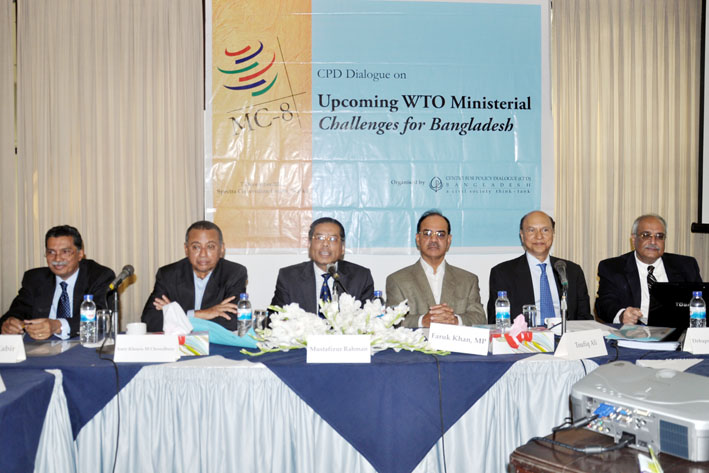On the eve of Eighth WTO Ministerial Conference CPD organised a dialogue on Upcoming WTO Ministerial: Challenges for Bangladesh at the Spectra Convention Centre on 7 December 2011. Bangladesh should focus more on non-tariff issues and not duty-free quota-free market access at the (then) upcoming WTO Ministerial, said Dr Debapriya Bhattacharya, Distinguished Fellow, CPD and Former Bangladesh Ambassador to the WTO and UN Offices in Geneva while presenting a paper titled Doha is Dead, WTO Wins? at the dialogue. Professor Mustafizur Rahman, Executive Director, CPD presided over the session.
Dr Bhattacharya said global economy is going through a critical time with soaring inflation, debt crisis and double-dip recession. Therefore, positive outcome from the Conference is hardly possible. Bangladesh has been raising DF-QF market access issues in previous WTO meetings without any outcome so far. Moreover, DF-QF has become more a political issue now. “In this situation we should move to second generation issues such as the rules of origin, non-tariff barriers and rules, and Intellectual Property Rights”, Dr Bhattacharya observed. Other speakers opined that Bangladesh needs to explore human resource exports to the developed nations under services sector waivers which might help expand Bangladesh’s trade and export. The issue, however, should be negotiated in a way so that the developed nations cannot put any condition.
Speaking as the Chief Guest Commerce Minister Lt Col (Retd) Muhammad Faruk Khan, psc, MP (who led the delegation in the Conference) mentioned that he was happy with the preparations taken by the government for the Geneva meeting. In this context he appreciated the suggestions he received from different stakeholders including trade bodies and think tanks.
Former Commerce Minister Amir Khosru Mahmud Chowdhury stressed on pursuing DF-QF access of Bangladeshi products to the US market directly at the political level. He also agreed that Bangladesh has much potential to be benefitted from export of skilled and unskilled manpower.
Current and former high level government officials, eminent business leaders, academics, researchers and development partners also participated in the discussion.



